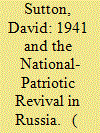| Srl | Item |
| 1 |
ID:
164268


|
|
|
|
|
| Summary/Abstract |
Hitler’s invasion of the USSR has long been a source of historiographical controversy. In the West, the version of events pushed by former German commanders, which emphasized Hitler’s mistakes, the weather, and brutal Soviet profligacy, became the dominant Cold War explanation for Hitler’s failure to take Moscow. This explanation no longer finds many adherents among Western historians. The official Soviet explanation emphasized the treacherous German attack, heroic resistance by the Red Army, and the solidarity of the Soviet government and people. During glasnost’, a ‘revisionist’ critique of the Soviet view fervently attacked once-sacred shibboleths surrounding the prosecution of the war. This article explores the evolving anti-revisionist ‘national-patriotic’ version of 1941 that has become the new dominant paradigm in Russia.
|
|
|
|
|
|
|
|
|
|
|
|
|
|
|
|
| 2 |
ID:
164265


|
|
|
|
|
| Summary/Abstract |
This article examines the Russian military involvement on land in Syria and in the Eastern Mediterranean Sea. It considers, in particular, why the point is constantly being made in Russian political and military circles that these two commitments will be ‘permanent’ in nature. It begins by providing the rationales for the initial establishment of a Russian Eastern Mediterranean naval flotilla and the later sending of ground troops with air support to Syria. It goes on to show what benefits — geopolitical, political, military, and, in particular, strategic — have accrued to Russia from the combination of these two missions. The article concludes by showing that these benefits are too substantial for any Russian political leader to contemplate a withdrawal from Syria at any point in the foreseeable future.
|
|
|
|
|
|
|
|
|
|
|
|
|
|
|
|
| 3 |
ID:
164269


|
|
|
|
|
| Summary/Abstract |
Relying on a wide range of sources, this article examines the implementation of mobilization plans by state, military, and local authorities of Siberia during the mobilization campaigns of the summers of 1914 and 1941. It reveals the consistent pattern of difficulties encountered by Siberian military districts when attempting to fulfill mobilization plans over the periods of World Wars I and II.
|
|
|
|
|
|
|
|
|
|
|
|
|
|
|
|
| 4 |
ID:
164267


|
|
|
|
|
| Summary/Abstract |
Increased activity and more aggressive behavior at sea have revitalized interest in the Russian Navy. Moscow communicates grand naval ambitions through official doctrines, while in reality the Navy is being developed as a predominantly coastal defense force. In the light of a troubled Russian economy, this raises the question of whether the Russian Navy is in fact increasing in strength, as the official rhetoric suggests, or rather is a declining force. This article examines how current geopolitical and economic factors influence Russian naval development. It argues that despite an inevitable decline in inventory, the Russian Navy is adapting pragmatically to the strategic and geopolitical circumstances and should be recognized as a capable potential adversary in the years to come.
|
|
|
|
|
|
|
|
|
|
|
|
|
|
|
|
| 5 |
ID:
164270


|
|
|
|
|
| Summary/Abstract |
Although much has been written about tank losses during the fighting near Prokhorovka as part of the battle for the Kursk salient in July 1943, little has been written about losses in personnel. This research note addresses the issue of Soviet personnel losses during the battle.
|
|
|
|
|
|
|
|
|
|
|
|
|
|
|
|
| 6 |
ID:
164266


|
|
|
|
|
| Summary/Abstract |
Russia’s Arctic policy keeps going along two poorly compatible tracks of expanding military activities and committing to international cooperation. Exaggerated threat assessments are typically advanced to justify the strongly set strategic priority for sustaining investments in building up the military capabilities, including nuclear forces. The option for developing cooperation has become unprofitable due to the sanctions regime, but its main downside is that it denies Russia the opportunity to exploit the perceived and highly valued position of power it holds in the Barents region. Russia has the capabilities and can create opportunities for forceful proactive advances in the High North, and caution is not a behavior pattern that can be expected from an essentially authoritarian regime that is threatened by domestic discontent and external pressure.
|
|
|
|
|
|
|
|
|
|
|
|
|
|
|
|